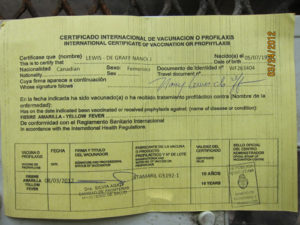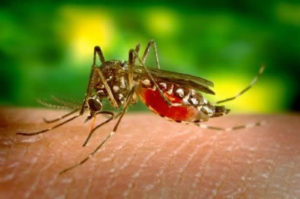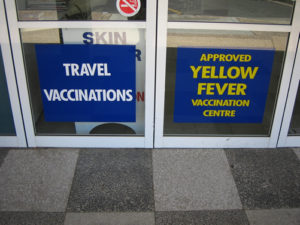Yellow Fever Vaccination Certificate requirements are different for each country in Africa. The continent of Africa is large with about 54 countries. Many of them lie in areas which receive enough rain and sunshine enabling a greater variety of wildlife including insects and vegetation. The high level of humidity allows bacteria/germs to thrive hence causing diseases that are not common in many other places around the world.
 Some of the diseases that occur in some African countries include Ebola, polio, the Zika virus, measles, Hepatitis A, Typhoid, rabies, cholera, chickenpox and tetanus. While traveling to Africa, one needs to be aware of the different vaccinations that are required in each of the countries.It is important to note most of these diseases occur in only a few countries of the African countries. Even when epidemics appear, the governments are well prepared and have access to advanced medicine and tools to curb them. Cases of the Zika virus fare very rare in Africa.
Some of the diseases that occur in some African countries include Ebola, polio, the Zika virus, measles, Hepatitis A, Typhoid, rabies, cholera, chickenpox and tetanus. While traveling to Africa, one needs to be aware of the different vaccinations that are required in each of the countries.It is important to note most of these diseases occur in only a few countries of the African countries. Even when epidemics appear, the governments are well prepared and have access to advanced medicine and tools to curb them. Cases of the Zika virus fare very rare in Africa.
The Ebola Virus only appears once in a while in only a few countries. Most countries in Africa have never had cases of Ebola or the Zika Virus. The greatest threat to travelers in Africa are diseases caused by mosquitoes. There is a high prevalence of malaria in many of the countries than it was 4 decades ago. This is mainly because overpopulation and encroachment on wetlands/forests that has left a lot of stagnant water. 7 decades ago, most of the streams, rivers and lakes in Africa would flow freely and would naturally present breeding difficulty for mosquitoes. Mosquitoes breed in stagnant water.
Yellow fever vaccination while on safari
Before traveling to Africa on a safari, you need to discuss with your doctor about the medical situation in the particular country/countries you will be visiting. In this article, we will be discussing the vaccinations that are required when traveling to Uganda, Rwanda and the Democratic Republic of Congo. Unlike malaria which has a cure, yellow fever is a real problem while traveling to a few African countries. It is therefore important to ensure that you are vaccinated against yellow fever when traveling to any of the countries where the virus is found. We hope that by the time you finish reading this article, you would have learnt some facts about yellow fever and the vaccination card.
What is yellow fever?
 The Yellow Fever Virus is transmitted by special type of mosquito belonging to the Haemogogu and Aedes species. These mosquitoes are found in both homes and in the wild. It is the same mosquito that is responsible for spreading the famous Zika virus. Whereas Yellow fever virus can be contained with a vaccine, the Zika Virus has no effect vaccine. It is important to note that not all mosquitoes carry the yellow fever virus. Not all mosquitoes carry the Zika or malaria parasites
The Yellow Fever Virus is transmitted by special type of mosquito belonging to the Haemogogu and Aedes species. These mosquitoes are found in both homes and in the wild. It is the same mosquito that is responsible for spreading the famous Zika virus. Whereas Yellow fever virus can be contained with a vaccine, the Zika Virus has no effect vaccine. It is important to note that not all mosquitoes carry the yellow fever virus. Not all mosquitoes carry the Zika or malaria parasites
Types of Yellow fever
There are three forms of yellow fever: –
Sylvatic yellow fever: This type is spread by mosquitoes living in rain-forests or the wilderness. They feed on blood from primates and other forest creatures but can bite humans who enter and live close to forests. If you are planning to visit a forest like Maramagambo in Uganda or any wetland in East African, you need to be careful about this type of mosquito. Only a few of the mosquitoes are actually infected with the virus causing Sylvatic yellow fever. Nevertheless, you need to take the necessary precautions.
Intermediate yellow fever: This type is spread by some of the mosquitoes that live in both homes and in the wild. They can infect primates and people living in home. If you are not vaccinated, you could get infected while in your lodge or hotel room.
Urban yellow fever: This is arguably the most dangerous type. It can be spread when an infected person from the rural areas visits the urban area. A mosquito in the urban area bites the carrier and then spreads it to many other people. This type of yellow fever is even more dangerous if there is a high concentration of Aedes Aegypti mosquitoes in urban areas due to the presence of stagnant water. Many lives can be put at risk when there is a high prevalence of the disease in urban areas.
What are the symptoms of yellow fever?
Once a person is beaten by an infected mosquito, the virus remains dormant in the body for between three to six days. The first signs of the disease are muscle pains, nausea, shivering, loss of appetite and vomiting. As it gets worse, fever and vomiting increases. The patient can start to bleed from the mouth, eyes and eyes while feeling abdominal pains. In worst case scenarios, the kidney could fail and the patient dies between 10 – 14 days.
Note: The symptoms of Yellow fever may be mistaken or confused with other diseases showing similar signs – like typhoid and malaria. The only way to find out once one starts getting worrying symptoms is to go for medical checkup.
How to treat and prevent yellow fever while traveling to Kenya, Rwanda and Uganda
Is there a cure for Yellow fever? Unfortunately, there is no cure for yellow fever at the moment. It is only the symptoms that can be treated. The good news is that the vaccine works almost 100% in preventing the disease – as long as you take the shots 10 days before contact with an infected mosquito. This vaccine  can only be administered by health facilities that have been identified and approved by the World Health Organization and Centre for Disease control. It is only such facilities that have the original/genuine yellow fever vaccination cards or certificates from the World Health Organization. A traveler needs to be vaccinated at least ten days before traveling to areas known to have yellow fever cases before maximum protection can take effect. The traveler should have their vaccination card with them because they could be asked for it any time. Travelers should also ensure that they sleep under a mosquito net whenever traveling to any of the counties we shall discuss later on.
can only be administered by health facilities that have been identified and approved by the World Health Organization and Centre for Disease control. It is only such facilities that have the original/genuine yellow fever vaccination cards or certificates from the World Health Organization. A traveler needs to be vaccinated at least ten days before traveling to areas known to have yellow fever cases before maximum protection can take effect. The traveler should have their vaccination card with them because they could be asked for it any time. Travelers should also ensure that they sleep under a mosquito net whenever traveling to any of the counties we shall discuss later on.
The Yellow Fever vaccination certificate
The recent outbreak of yellow fever in Angola has forced many African countries to enforce strict rules regarding traveling with yellow fever vaccination certificates. This is because someone with the virus could enter their country and be beaten by resident mosquitoes which can then start spreading the virus to their citizens and travelers. The checks are therefore to protect not only their citizens but also tourists/travelers.
All travelers who are deemed to be at risk of getting yellow fever are generally required to possess a valid yellow fever vaccination certificate before entering Uganda, Rwanda, Kenya, Tanzania and the Democratic Republic of Congo. You might be required to show the card at the airports or border entry points.
Who needs a yellow fever vaccination card?
All travelers coming from yellow fever endemic countries are required to have the card. Travelers from countries without mosquitoes or the virus are also required to possess the card. Only infants, pregnant women, people with allergies to egg protein, persons with severe immunodeficiency due to diseases like cancer or HIV/AIDS may be exempted from vaccination. It is important to seek medical advice and let your doctor know of any serious medical condition you have before taking the yellow fever shot. The doctor can then give you a special form exempting you from taking the yellow fever shot. This special form can then be shown to migration officials.
The yellow fever endemic counties are Venezuela, Uganda, Trinidad and Tobago, Togo, Suriname, Sudan, South Sudan, Senegal, Peru, Paraguay, Panama, Nigeria, Niger, Mauritania, Mali, Liberia, Sierra Leone, Kenya, Guinea-Bissau, Guinea, Ghana, Gambia, Gabon, French Guiana, Ethiopia, Equatorial Guinea, Ecuador, Democratic Republic of the Congo, Côte d’Ivoire, Congo, Chad, Colombia, Central African Republic, Cameroon, Burundi, Burkina Faso, Brazil, Bolivia, Benin, Argentina and Angola.
Note: Angola is the only active Yellow Fever transmission outbreak country at the moment and things could change.
Information about Yellow fever Vaccination Cards in Rwanda, Kenya and Congo
Yellow fever vaccination card in Rwanda
Implementation of rules regarding yellow fever is quiet relaxed in Rwanda. Visitors who arrive into the country from non-endemic countries do not need to have the yellow fever card at the moment. If you are coming from countries with the virus, you can get a waiver. Only a doctor from a registered provider of the vaccine can provide the waiver. The medical exemption needs to be done in writing using a special form or on the yellow fever card itself. Apart from yellow fever, travelers to Rwanda might need vaccinations against Typhoid and Hepatitis A. Rabies and Hepatitis B are very rare. Rwanda has reported a few cases of the Zika Virus.
Yellow fever vaccination certificate in Kenya
Travelers to Kenya are advised to get the yellow fever shot before arriving at the airport or any of the border crossings. This is more so if they are planning to also do a safari in Tanzania. To cross to Tanzania, a yellow fever vaccination card will be required. Apart from yellow fever, travelers should consider getting a vaccination against Meningitis. There have also been isolated reports of the Zika virus but you need to be very unlucky to get infected.
Yellow fever vaccination card in Uganda
Yellow fever cases are almost non-existent in Uganda but there have been outbreaks in the past. Travelers should ensure that they are vaccinated before arriving in Uganda. The outbreak of yellow fever in Angola forced Uganda to require that all travelers show their yellow fever cards. If one doesn’t have, they have no alternative but to pay and be given the shot at the airport. Uganda also has cases of Typhoid, Hepatitis A, malaria and isolated cases of rabies. Other diseases to watch out for are Hepatitis B, Meningitis and cholera. If you are planning to stay for a long period in the country and will be having direct contact with animals, you should consider getting vaccinated against most of the diseases mentioned. The choice of which vaccination to take depends on whether you will be staying in a rural or urban setting. It will also depend on the length of your stay, local outbreaks, quality of accommodation, the kind of activities you will be involved in, your medical and vaccination history.
Yellow fever requirements in the Democratic Republic of Congo
Before crossing borders to Congo or entering the country through the airport, you will be required to show proof of yellow fever vaccination. Border and immigration officials are stricter while implementing the yellow fever vaccination rule compared to other countries. This is partly because Congo is a large country that has had to deal with outbreaks of Ebola, hepatitis A, hepatitis B, typhoid, cholera, tetanus, rabies, flu, meningitis and diphtheria.
Cost of Yellow Fever Certificate in Uganda, Rwanda and Congo
Before traveling to Uganda, Rwanda, Kenya and the Democratic Republic of Congo, you need to visit your doctor or the nearest health facility to get the necessary advice. Your doctor should advice you on what vaccines and medication to take based on your medical condition (including any allergies).
Try to ensure that you get medical insurance. This should include medical evacuation in case of any nasty incident. Most of the national parks in Africa are located far away from the best medical facilities. With insurance, you are sure that you will be evacuated in case of a medical emergency. Check with your embassy or health facility on how to get the best medical insurance.
Before traveling, check to see that you had all the important childhood vaccinations for polio, mumps, measles, rubella, tetanus, whooping cough, diphtheria and meningitis. Other optional diseases to consider include flu and pneumonia. It is important to take the vaccination days or weeks in advance. One reason is that many of the shots take a while to work. You might also need to visit the doctor several times to take different shots for different diseases.
The best place to take the yellow fever vaccination before embarking on an African safari is from the nearest travel clinic in your town. Most of the major cities have a travel clinic and are experienced in dealing with travelers to African countries. If none is available within your vicinity, let your doctor connect you to the right Specialists. It is also important to have a comprehensive health check up to know your health status before traveling to Africa.
In order to stay safe while in Uganda, Congo, Kenya and Rwanda, make sure you have the right clothing. Wear long sleeved shirts and long trousers while walking in the forest. Clothes with bright colors attract insects. Blue shirts tend to attract Tses Tse flies. Taking sugar is thought to attract mosquitoes but a good insect repellent will keep them away. You should ensure that you spray your hotel room with an insecticide before entering bed. Always sleep under a mosquito net.

What is the cost of yellow fever vaccine?